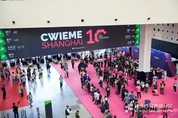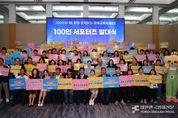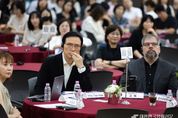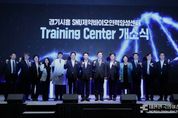-

Vantage Foundation partners with KDM Foundation to support street children in Jakarta
Jakarta, Indonesia, July 3, 2025 -- Vantage Foundation has partnered with KDM Foundation, a Jakarta-based nonprofit organization dedicated to transforming the lives of homeless children through education, creativity, and sustainable living, as part of its community contribution activities. Vantage Foundation Joins Hands with KDM Foundation to Empower Street Children in Jakarta During a recent visit to the KDM campus, representatives from the Vantage Foundation were welcomed by Sotar Sinaga, a board member of the KDM Foundation. He shared the organization's holistic approach to youth developm
- 기자
- 2025-07-09 06:12
-

A Decade of Dreams and Glory: The 10th CWIEME Shanghai Closes Successfully and Ignites a New Beginning for 2026
Shanghai, July 4, 2025 -- The 10th CWIEME Shanghai, a major milestone for the industry, concluded successfully on June 27, marking the perfect finale of the event. Over the past decade, CWIEME has continuously improved and established itself as a leading industry indicator in the global motor and transformer manufacturing sector, integrating cutting-edge technology exhibitions, industry trend forecasts, and global resource networking into an international platform. CWIEME Shanghai is the most influential industry event in the Asia-Pacific region and serves as an important indicator for the g
- 기자
- 2025-07-09 06:10
-

Yeonsu-gu signs international friendship city agreement with Cottonwood Heights, Utah, USA
Yeonsu-gu and Cottonwood Heights, Utah, USA (Mayor Mike Wakers) have signed an international friendship city agreement. The district dispatched a delegation to visit the city at the invitation of Cottonwood Heights, Utah, and on the 5th (local time), the two cities signed the “International Sister City Agreement” at the Cottonwood Heights City Hall, pledging to actively promote exchanges and cooperation in areas such as administration, culture, education, and economy. Accordingly, the two cities will promote continuous communication and cooperation systems, including establishing a permanent c
- 관리자 기자
- 2025-07-09 06:07
-

Chungbuk Office of Education, 100 People's Power! Chungbuk Education Expo for a Leap Forward Together
The Chungcheongbuk-do Office of Education held the “2025. Empathy & Togetherness Chungcheongbuk-do Education Expo 100-Person Supporters Launch Ceremony” on the 8th at the Enford Hotel, targeting over 100 participants including students, parents, school staff, and residents of the province. The 2025. Empathy & Togetherness Chungbuk Education Expo is an event that provides opportunities to experience the excellent educational activities and policies of Chungbuk education. This is the second edition of the education expo, following the first event held in 2024. The 100 supporters are a su
- 관리자 기자
- 2025-07-09 06:04
-

Superintendent Lim Tae-hee: “Gyeonggi Provincial Office of Education will take the lead in creating a more peaceful and just global village through international exchange and cooperation.”
On the 8th, the Gyeonggi Provincial Office of Education held the “2025 International Exchange and Cooperation Conference” at the International Hall of the National Institute of International Education with the theme of “Global Education Cooperation for a Peaceful and Sustainable Global Community.” The event was attended by about 200 people, including domestic and international education experts, teachers, and officials from the Office of Education. For those who wished to participate online, the event was broadcast live on the Gyeonggi Provincial Office of Education YouTube channel (GO3). The
- 관리자 기자
- 2025-07-09 06:02
-

SNU Pharmaceutical Bio Human Resources Training Center Opens in Siheung, Gyeonggi Province
On July 7, Siheung City opened the “Gyeonggi Siheung SNU Pharmaceutical Bio-Pharmaceutical Human Resources Training Center” on the 5th floor of the Education Cooperation Building at Seoul National University's Siheung Campus and began full-scale educational operations. The establishment of this center follows the completion of educational facilities and equipment construction through collaboration between Gyeonggi Province, Siheung City, and Seoul National University, following the selection of the center as a recipient of the World Health Organization (WHO) Global Bio Regional Campus Program
- 관리자 기자
- 2025-07-09 06:00
-

President Lee Jae-myung meets with Cardinal Yoo Hyung-sik, Prefect of the Congregation for the Clergy
President Lee Jae-myung met with Cardinal Yoo Hyung-sik, Prefect of the Congregation for the Clergy, who is visiting South Korea, for about 40 minutes starting at 2 p.m. on the 7th. President Lee Jae-myung expressed his delight over the active exchanges between South Korea and the Holy See since the establishment of diplomatic relations in 1963, and expressed his hope to further strengthen the friendly and cooperative relationship between the two sides. He also expressed his expectation for the role of Cardinal Yu, who is the first Korean to hold the position of Secretary of the Congregation f
- 관리자 기자
- 2025-07-09 05:58
-

Ministry of Maritime Affairs and Fisheries, Asian Cruise Industry, Setting Sail for a New Era of Growth
The Ministry of Oceans and Fisheries announced that it will co-host the 12th Jeju International Cruise Forum (2025 ASIA Cruise Forum Jeju) with Jeju Special Self-Governing Province from July 10 to July 12 for three days in Jeju Island. The Jeju International Cruise Forum is Asia's leading cruise industry forum, held annually since 2013. It has contributed to the development of Asia's cruise industry by providing a platform for key stakeholders in the region to share the latest industry trends and discuss collaboration opportunities. This year, under the theme of “2035 Asia Cruise Vision – Sail
- 관리자 기자
- 2025-07-09 05:54
-

일본어 기초 회화 2
【오늘의 대화 | Today's Dialogue】 A: お昼ご飯(ひるごはん)、もう食べましたか?(Ohiru gohan, mō tabemashita ka?)점심 벌써 먹었어요? B: まだです。いっしょに食べましょう!(Mada desu. Issho ni tabemashō!)아직 안 먹었어요. 같이 먹어요! A: いいですね。行きましょう!(Ii desu ne. Ikimashō!)좋아요! 가요! 【키워드 | Keywords】 단어 히라가나 뜻 お昼ご飯 おひるごはん 점심밥 もう もう 이미, 벌써 食べましたか たべましたか 먹었어요? まだ まだ 아직 いっしょに いっしょに 함께, 같이 食べましょう たべましょう 먹읍시다 (제안) 行きましょう いきましょう 갑시다 (제안) いいですね いいですね 좋네요 / 좋아요 【핵심 문구 해설 | Key Phrase Breakdown】 1️⃣ お昼ご飯、もう食べましたか? 점심 벌써 먹었어요? 일본에서는 식사 여부 묻는 말로 자연스러운 인사로도 자주 사용해요. 친구, 선생님, 동료
- 관리자 기자
- 2025-07-09 00:10
-

Chungbuk Superintendent Yoon Gun-young explores ways to develop diversity with world-renowned education scholar Prof. Paul Kim
The Chungcheongbuk-do Office of Education announced that on the morning of the 27th, the Chungcheongbuk-do Office of the Superintendent of Education hosted a Future Education Roundtable with Professor Paul Kim, a world-renowned education scholar, Senior Associate Dean at Stanford Graduate School of Education, and an expert in educational technology and digital learning. The meeting was held at the suggestion of the Korean Secondary School Principals' Association, and was organized to share global education innovation trends and to refine the direction of Chungbuk's education policy in response
- 관리자 기자
- 2025-06-27 22:24
-
 Entertainment · Broadcasting
Fair Play Menarini International Award, 29th Award Ceremony marked by waves of emotion
Entertainment · Broadcasting
Fair Play Menarini International Award, 29th Award Ceremony marked by waves of emotion
-
 Entertainment · Broadcasting
The Rose, the first Korean band to perform at Coachella, confirms Seoul concert on August 30 for “Once Upon a WRLD”
Entertainment · Broadcasting
The Rose, the first Korean band to perform at Coachella, confirms Seoul concert on August 30 for “Once Upon a WRLD”
-
 Culture · Events
Incheon Port Authority kicks off the 6th Incheon International Marine Forum in Songdo, Incheon, to look into the future of the global marine industry
Culture · Events
Incheon Port Authority kicks off the 6th Incheon International Marine Forum in Songdo, Incheon, to look into the future of the global marine industry
-
 Culture · Events
Seocho Symphony Orchestra to hold performances in Berlin, Germany, and London, England, commemorating the 80th anniversary of liberation and the 75th anniversary of the Korean War
Culture · Events
Seocho Symphony Orchestra to hold performances in Berlin, Germany, and London, England, commemorating the 80th anniversary of liberation and the 75th anniversary of the Korean War
-
 Culture · Events
Gyeonggi Province to hold its largest job fair for middle-aged and older workers on the 9th. 1,000 jobs to be filled.
Culture · Events
Gyeonggi Province to hold its largest job fair for middle-aged and older workers on the 9th. 1,000 jobs to be filled.
-
 International
Jeju's soul resonates in Rome... Singing of the pain and reconciliation of Jeju 4·3
International
Jeju's soul resonates in Rome... Singing of the pain and reconciliation of Jeju 4·3
-
 International
Seoul City establishes a foothold for K-Beauty and fashion to enter the European market, promoting Milan as a base
International
Seoul City establishes a foothold for K-Beauty and fashion to enter the European market, promoting Milan as a base
-
 Medical · Health
Korean Centers for Disease Control and Prevention: Increase in hand, foot, and mouth disease among infants and young children! Follow preventive measures and maintain good hygiene to stay healthy.
Medical · Health
Korean Centers for Disease Control and Prevention: Increase in hand, foot, and mouth disease among infants and young children! Follow preventive measures and maintain good hygiene to stay healthy.
-
 Medical · Health
Korean Centers for Disease Control and Prevention: Injured patients account for the largest proportion of hospitalized patients; falls are the main cause
Medical · Health
Korean Centers for Disease Control and Prevention: Injured patients account for the largest proportion of hospitalized patients; falls are the main cause
-
 Medical · Health
WHO and international health experts visit Wanju local food production sites
Medical · Health
WHO and international health experts visit Wanju local food production sites
-
2026-01-29 23:44
11
-
2026-01-28 23:36
No. 6 Reporter
-
2025-12-09 14:30
Seong Ki-sun's Book Launch Event ‘Education in Turmoil’...Seeking Hope for Public Education Through Basic, Relationship, Growth (BRG)
-
2025-11-04 13:48
JP EDU - Hidden Opportunities in Japan: English-Taught International Studies Programs Open Doors to Prestigious Universities
-
2025-10-27 11:03
2026 대한민국영어신문 주니어 영어 기자단 모집





















